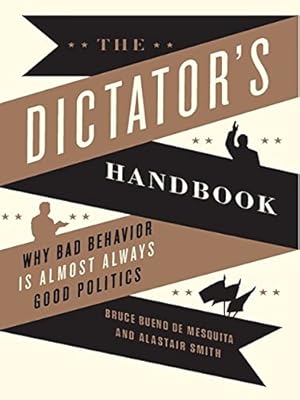📕 subnode [[@bbchase/the dictator s handbook]]
in 📚 node [[the-dictator-s-handbook]]
- Author:: [[Bruce Bueno de Mesquita, Alastair Smith]]
- Full Title:: The Dictator's Handbook
- Category:: [[books]]

-
Highlights first synced by [[readwise]] [[September 2nd, 2020]]
- States don’t have interests. People do. (Location 350)
- what, for a leader, is the “best” way to govern? The answer to how best to govern: however is necessary first to come to power, then to stay in power, and to control as much national (or corporate) revenue as possible all along the way. (Location 358)
- To understand politics properly, we must modify one assumption in particular: we must stop thinking that leaders can lead unilaterally. (Location 397)
- no leader whatsoever can govern alone. (Location 402)
- When debt exceeds the ability to pay, the problem for a leader is not so much that good public works must be cut back, but rather that the incumbent doesn’t have the resources necessary to purchase political loyalty from key backers. (Location 417)
- Bad economic times in a democracy mean too little money to fund pork-barrel projects that buy political popularity. (Location 419)
- No one rules alone; no one has absolute authority. All that varies is how many backs have to be scratched and how big the supply of backs available for scratching. (Location 451)
- For leaders, the political landscape can be broken down into three groups of people: the nominal selectorate, the real selectorate, and the winning coalition. (Location 453)
- The nominal selectorate includes every person who has at least some legal say in choosing their leader. (Location 455)
- The second stratum of politics consists of the real selectorate. This is the group that actually chooses the leader. (Location 462)
- The most important of these groups is the third, the subset of the real selectorate that makes up a winning coalition. These are the people whose support is essential if a leader is to survive in office. (Location 464)
-
In the United States the winning coalition is vastly larger. It consists of the minimal number of voters who give the edge to one presidential candidate (or, at the legislative level in each state or district, to a member of the House or Senate) over another. (Location 468)
- Note: What bout financial backers, media, and social influencers?
- A simple way to think of these groups is: interchangeables, influentials, and essentials. (Location 473)
- In the United States, the voters are the nominal selectorate—interchangeables . As for the real selectorate—influentials—the electors of the electoral college really choose the president (just like the party faithful picked their general secretary back in the USSR), but the electors nowadays are normatively bound to vote the way their state’s voters voted, so they don’t really have much independent clout in practice. In the United States, the nominal selectorate and real selectorate are therefore pretty closely aligned. (Location 474)
- The winning coalition—essentials—in the United States is the smallest bunch of voters, properly distributed among the states, whose support for a candidate translates into a presidential win in the electoral college. (Location 479)
- it’s possible to control the executive and legislative branches of government with as little as about one fifth of the vote, (Location 482)
- Most publicly traded corporations have this structure as well. (Location 498)
- Leaders make rules to give all citizens the vote—creating lots of new interchangeables—but then impose electoral boundaries, stacking the deck of essential voters to ensure that their preferred candidates win. (Location 536)
- Democratic elites may decide to require a plurality to win a particular race, giving themselves a way to impose what a majority may otherwise reject. (Location 537)
- Why, for example, does Congress gerrymander districts? Precisely because of Rule 1: Keep the coalition as small as possible. Why do some political parties favor immigration? Rule 2: Expand the set of interchangeables. Why are there so many battles over the tax code? Rule 3: Take control of the sources of revenue. Why do Democrats spend so much of that tax money on welfare and social programs? Or why on earth do we have earmarks? Rule 4: Reward your essentials at all costs. Why do Republicans wish the top tax rate were lower, and have so many problems with the idea of national health care? Rule 5: Don’t rob your supporters to give to your opposition. (Location 709)
📖 stoas
- public document at doc.anagora.org/the-dictator-s-handbook
- video call at meet.jit.si/the-dictator-s-handbook